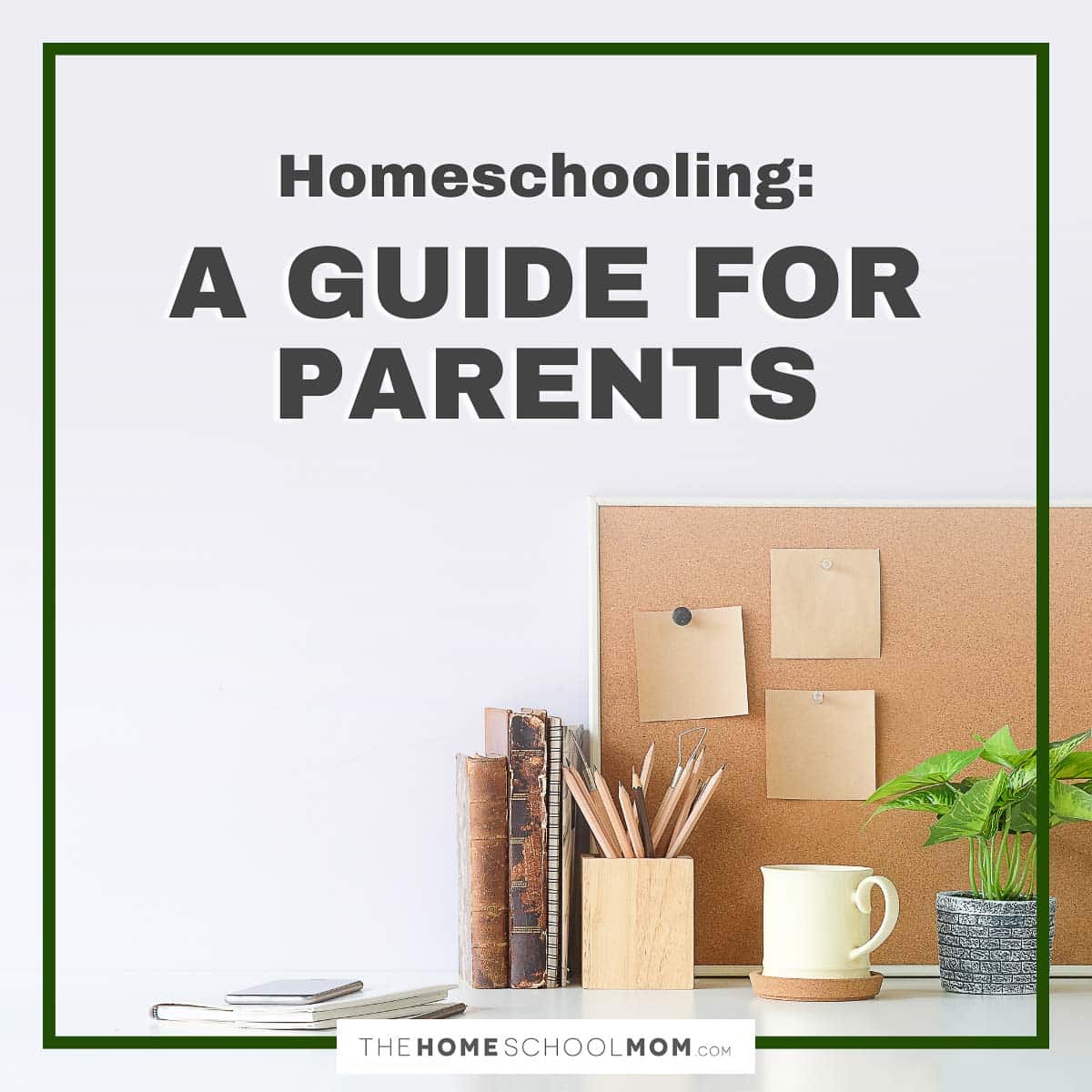As a growing number of families choose to homeschool their children, curiosity about the homeschooling movement has grown.
Learn about homeschooling, including how homeschooling works, what the requirements to homeschool are, how to start homeschooling, what curriculum to use for homeschooling, how to make a homeschool schedule, and more.
Jump to:

What Is homeschooling?
Homeschooling is an education option in which parents direct their children's education rather than enrolling them full-time in a public school or private school. Homeschooling parents take charge of their children's education through learning at home, joining co-ops, hiring tutors, participating in academic clubs, taking community college classes, and much more.
Homeschooling is parent-directed and/or child-directed education that allows for a personalized education plan. Some homeschoolers may take advantage of part-time enrollment offered through public or private schools while others may entirely opt-out of institutional education.
As formal preschool has become more popular, more parents who do not send their kids to preschool also refer to this as "homeschooling" in preschool or pre-K, but the term usually refers to students educated at home from kindergarten through homeschooling high school.
What are the pros and cons of homeschooling?
Homeschooling is widely known for its flexibility, allowing parents to help children learn in the ways that work for each child. Parents and kids do not need to follow the conventions of school when they're homeschooling; they can customize, choosing their own curriculum or approach. Homeschooled kids are widely accepted at colleges and in the workplace.
There is a wide range of advantages of homeschooling, from building positive family relationships to homeschooling through illnesses and challenges. Families often find that the advantages of homeschooling include:
- academic benefits
- mental health benefits
- benefits in social development
- benefits in physical health
- benefits in special circumstances
- and even homeschooling benefits for parents!
Be sure to check out our extensive discussion of the benefits of homeschooling.
Families do need to consider that homeschooling may affect specific situations, particularly in high school:
- The Virginia High School League (VHSL) prohibits homeschooled students from participating in high school athletic programs in the state.
- New York's "preliminary education requirements," which do not prevent homeschoolers from graduating from high school or enrolling in college, but are required in some form before a student can graduate from college. Since at least one of the options must be completed while the student is still of compulsory school age, it is imperative that homeschoolers know the education laws of their state and of any state where they may wish to attend college.
- Transferring homeschool credits into a public high school may not be possible. Most families commit to homeschooling through high school graduation if they plan to homeschool high school.
For families who want the flexibility, academic benefits, efficiency, and opportunities that home education can offer, homeschooling is a natural choice.
Homeschooled graduates can be admitted to college, join the military, get good jobs, start businesses, and live creative lives.
How do I get started homeschooling?
Typically, homeschooling starts with notifying the local school district of the intent to homeschool. Like public schooling, homeschooling is regulated by the state so parents need to know what is required (if anything) in your state.
Getting connected with local homeschoolers is the best way to learn more about local requirements as well as find out what activities, classes, and events are available nearby.
To start homeschooling, jump in with our How to Homeschool guide.
What are the requirements for homeschooling?
Homeschooling is legal and accepted in all fifty states in the United States and in many countries around the world. In the United States, homeschooling is regulated by the state, so homeschool laws are unique to each state.
Some states have no requirements; others might have requirements such as:
- Keeping attendance to show compliance with compulsory attendance law
- Notification/letter of intent to homeschool to the school district or superintendent
- Achievement tests or evaluations
- Naming your homeschool
Find more information about your state homeschool law through your state's homeschooling organization.
What about planning and choosing curriculum for homeschooling?
Parents can choose their homeschool curriculum, taking into account their overall approach to learning, their children's strengths, the amount of one-on-one time they can provide, their children's age and stage of development, and what their child enjoys doing. Some homeschoolers use a curriculum similar to what is found in schools, but many do not. Parents are free to choose the curriculum resources that best meet the needs of their family.
Homeschoolers have the freedom to do what works. They don't need to follow the education laws for public schools, and in the U.S., they don't need to follow any one specific approved or accredited curriculum.
Some states and countries have more regulations than others regarding what parents have to do to meet the home education law; however, in general, one of the benefits of homeschooling is that parents have the freedom to customize how their children learn. This includes freedom to choose their approach and the resources that will be used.
Homeschooling families can typically learn on any schedule that works for them.
How do I create a homeschooling schedule?
Some families have weekly schedules that look like school schedules, but most homeschooling families use the flexibility of homeschooling to create a weekly schedule that is customized for them. Take a look at some of the effective homeschool schedules that Jeanne Faulconer has seen in her work as a homeschool evaluator (you'll also find printable examples of common schedules).
Can someone else homeschool my child?
What if you want your kids to be homeschooled, but you can't or don't want to be the person who is personally homeschooling them? Laws vary on this depending on where you live, which parents should consider, but many homeschooling parents outsource parts of their kids' homeschooling, since the kids take classes, participate in co-ops, and work with tutors and mentors.
If you're looking for someone to provide part or all of your children's home education, read Can Someone Else Homeschool My Child?
Are there grade levels in homeschooling?
Grade levels were developed for schools, where numbers of students have to be moved through years of curriculum. While school is standards-based and grade-level-based, homeschooling can be potential-based.
Homeschooling allows parents to optimize the resources based on the child's potential and aptitude, rather than on grade placement. It offers students the ability to step out of an environment focused on "appropriate grade placement" and into an environment where institutional goals give way to engaged learning at the right level of challenge.
It is not unusual for a homeschool student to work at different grade levels in different subjects. Students are able to excel where they are ahead and work at a relaxed pace where they need to spend more time on a subject.
You can read more about grade levels in "Homeschooling and Grade Levels (Or … Relax)", as well as about "When Grade Level Matters."
What types of homeschooling styles do families use?
There are many ways to homeschool, with the different approaches referred to as homeschooling styles or types of homeschooling. Different styles work for different families because their situations and their children are different.
One family may love an approach that doesn't work at all for another family. People often start out with one approach and evolve to a different approach, or they combine aspects of several different styles and call themselves eclectic homeschoolers.
A word of warning: it's not unusual for new homeschool parents to try to replicate school at home when first homeschooling; they often switch approaches when they encounter resistance.
What is deschooling?
A surprising factor in the adjustment to learning at home is the idea of deschooling. Both parents and children need to transition to learning outside of the school classroom that is the predominant method of education today.
Experienced homeschoolers recommend a period of deschooling before homeschooling, and they suggest that families continue over time to get "school defaults" out of their heads so that learning outside of school will flourish.
What are online schools and hybrid homeschool programs?
In some states, there are various "hybrid homeschool" options due to families combining some elements of homeschooling with classes and programs offered by public schools, private schools, charter schools, colleges, and online schools.
Some hybrid models are illegal in one state while legal in a neighboring state. Not all hybrid models of education are considered homeschooling by all homeschoolers, even if the education is mostly taking place within the home. That hasn't stopped some from calling these newer combo-types of education hybrid homeschooling instead of hybrid education.
Parents should understand whether the resources they choose-particularly online or virtual schools- are independent or put them under the purview of the local public school district. Virtual schools might be not clearly be labeled as virtual public schools or public charter schools.
How do you get a homeschool diploma?
Families can print a diploma at home or order a professional version online. High school diplomas are simply certificates for a wall, while transcripts are the official documentation of high school grades and courses.
Homeschool transcripts are an accepted form of documentation showing that the student graduated, and schools and employers wanting proof of graduation will most often ask the graduate for a copy of their transcripts.
For more information about homeschooling high school, how to count high school credits, what transcripts are, and how to create transcripts (plus a free transcript template), read "Homeschool Transcripts Explained."
Do homeschoolers have to take the GED exam?
Although there are rare occasions when a homeschooler might need or want to take the GED exam, most often homeschool transcripts are a better and accepted choice. Four-year, junior, and community colleges all accept homeschool transcripts as proof of courses taken.
Nevertheless, homeschoolers should plan ahead as they enter high school. Researching the requirements of colleges, trade schools, unions, the military, or any other post-high school path that might interest them is necessary to ensure compliance with requirements.
This is particularly true when the student's future path might include college sports, trade schools, or other less common paths where additional testing or specific programs might be required.
Why do people homeschool?
The main reasons people homeschool are concerns about the environment in schools and dissatisfaction with academic instruction. NCES has collected data on why people are homeschooling. According to their 2016 education report,
When asked to select the reasons parents decided to homeschool their child, the highest percentage of homeschooled students had parents who said that a concern about the environment of other schools, such as safety, drugs, or negative peer pressure was one reason to homeschool (80 percent). The highest percentage of students' parents reported that among all reasons, a concern about the environment of other schools was the most important reason for homeschooling (34 percent). Seventeen percent of homeschooled students had parents who reported dissatisfaction with academic instruction at other schools as the most important reason for homeschooling, while 16 percent reported a desire to provide religious instruction as the most important reason for homeschooling.
[Source]
How many homeschoolers are there in the U.S.?
Homeschooling in the U.S. has grown considerably. In 1999, only about 1.7% of students aged 5-17 were homeschooled; by 2012, that number had doubled to 3.4%. [Source]
The disruption to public schools caused by school closings, virtual learning, mask mandates, and more led to record-breaking numbers of families choosing to homeschool at the beginning of the 2020-2021 academic year. According to the U.S. Census Bureau, "By fall, 11.1% of households with school-age children reported homeschooling." [Source]
How can grandparents support homeschooling?
Our Grandparent Guide to Homeschooling gives grandparents concrete ideas for how to help without interfering and suggestions for how they can further build their relationships with their homeschooled grandchildren. Others in a homeschooling family's support network might also find the Grandparent Guide helpful if they are participating in a material way.
More homeschooling answers
Didn't find the information you were looking for here? Visit our Frequently Asked Questions page for answers to other questions you might have about homeschooling.
Sources
NCES, "Homeschooling in the United States: 2012" (https://nces.ed.gov/pubs2016/2016096rev.pdf : accessed 30 September 2021)
U.S. Census Bureau, "Census Bureau's Household Pulse Survey Shows Significant Increase in Homeschooling Rates in Fall 2020 (https://www.census.gov/library/stories/2021/03/homeschooling-on-the-rise-during-covid-19-pandemic.html : accessed 30 September 2021)
NCES, "Parent and Family Involvement in Education: Results from the National Household Education Surveys Program of 2016," pg. 4 (https://nces.ed.gov/pubsearch/pubsinfo.asp?pubid=2017102 : accessed 30 September 2021)





Leave a Reply